初中英语 湖北省武汉市武汉第二初级中学七年级下册 Unit 9 重点短语和句型
七年级下册unit 9知识点
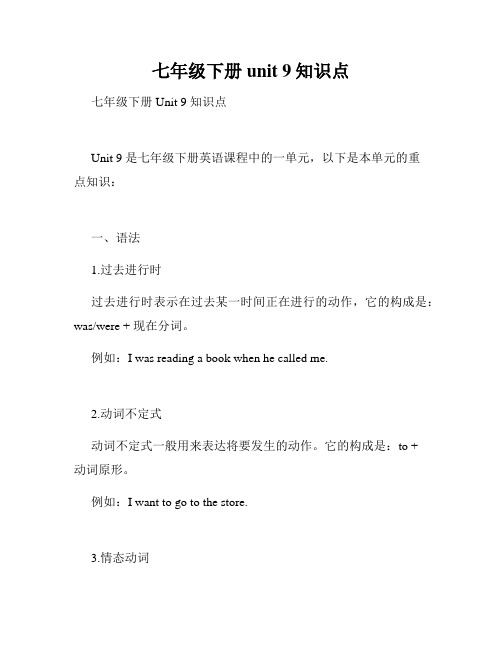
七年级下册unit 9知识点七年级下册 Unit 9 知识点Unit 9 是七年级下册英语课程中的一单元,以下是本单元的重点知识:一、语法1.过去进行时过去进行时表示在过去某一时间正在进行的动作,它的构成是:was/were + 现在分词。
例如:I was reading a book when he called me.2.动词不定式动词不定式一般用来表达将要发生的动作。
它的构成是:to +动词原形。
例如:I want to go to the store.3.情态动词情态动词用来表达说话人的情绪、态度或意愿。
常见的情态动词有 can, could, may, might, must, should, ought to,以及 need(必须)和 have to(不得不)。
例如:He can speak English fluently.二、词汇1.健康词汇healthy, unhealthy, diet, nutrition, exercise, sports, gym, fitness, weight, aerobic, playground, fresh, organic, junk food, fast food, snack例如:Eating junk food is not good for your health.2.外貌词汇tall, short, thin, fat, muscular, round-faced, square-faced, curly-haired, straight-haired, dark-skinned, fair-skinned例如:She has long and curly hair.3.动词词组get up, go to bed, take a shower, brush teeth, wash face, comb hair, get dressed, have breakfast/lunch/dinner, do homework, watch TV, play sports/games例如:I usually brush my teeth after breakfast.三、表达方式1.祝愿表示祝愿的常用语包括 congratulations(祝贺)、good luck (好运)、happy birthday(生日快乐)、merry Christmas(圣诞快乐)等。
七年级英语下册Unit9短语
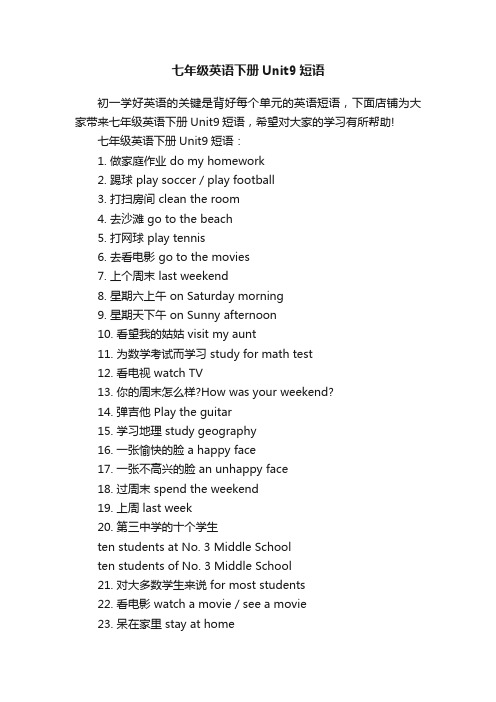
七年级英语下册Unit9短语初一学好英语的关键是背好每个单元的英语短语,下面店铺为大家带来七年级英语下册Unit9短语,希望对大家的学习有所帮助!七年级英语下册Unit9短语:1. 做家庭作业 do my homework2. 踢球 play soccer / play football3. 打扫房间 clean the room4. 去沙滩 go to the beach5. 打网球 play tennis6. 去看电影 go to the movies7. 上个周末 last weekend8. 星期六上午 on Saturday morning9. 星期天下午 on Sunny afternoon10. 看望我的姑姑 visit my aunt11. 为数学考试而学习 study for math test12. 看电视 watch TV13. 你的周末怎么样?How was your weekend?14. 弹吉他 Play the guitar15. 学习地理 study geography16. 一张愉快的脸 a happy face17. 一张不高兴的脸 an unhappy face18. 过周末 spend the weekend19. 上周 last week20. 第三中学的十个学生ten students at No. 3 Middle Schoolten students of No. 3 Middle School21. 对大多数学生来说 for most students22. 看电影 watch a movie / see a movie23. 呆在家里 stay at home24. 在星期天 on Sunny25. 在星期天上午 on Sunny morning26. 在上午 in the morning27. 在星期五晚上 on Friday night28. 一个繁忙的周末 a busy weekend29. 为我煮饭 cook dinner for me30. 看一本关于历史的书read a book about history31. 一个有趣的谈话节目an interesting talk show32. 写一首新歌 write a new song33. 练习我的吉他 practice my guitar34. 每个人喜欢他们的周末Everyone enjoys their weekends.35. 去散步 go for a walk=walk36. 晴天 a nice day / a fine day /a sunny day / a beautiful day37. 坐下 sit down38. 观看汪汪和一条友好的黑猫玩耍watch Wang Wang play with a friendly cat 观看某人做某事 watch sb do sth例:观看他们踢足球watch them play soccer39. 该……了。
七年级下册第九单元unit重点短语语法句型

3. 表征求建议
What about…=How about...
…怎么样
about是介词,后常跟名词、代词、动名词
例: 1How about going shopping
2What about this movie
主单/复+did not+V原.
c.1时间状语的变化:
现在时
过去时
Now现在
Then那时
Today今天
That day那天
Tomorrow明天
The next day第二天
Tomorrow morning
明天早晨
The next morning
第二天早晨
Last night昨天晚上
We are studyingnow.
catch--- caught come---came do---diddraw---drew
drink--- drank drive---droveeat--- atefall--- fell
2. It’s time to go home.
a.It is time to do sth.该做某事了;
行为动词无单复数: Did+人+V原+其它
Theylikedgame.Didtheylikegame
Helikedgame.Didhelikegame
否定句的基本结构:
Be动词类状态人+be not+其它.
He was a student.He was not a student.
行为动词类人+did not+V原+其它.
七年级英语u9知识点总结

七年级英语u9知识点总结本文主要介绍了七年级英语U9(Unit 9)知识点的内容,其中包括了单词、短语、语法和阅读理解等方面。
一、单词和短语1. break down:意为“坏掉,出故障”,例如:“The car broke down on the way home.”(车子在回家的路上坏了。
)2. have a look:意为“看一看”,例如:“Please have a look at this picture.”(请看看这张图片。
)3. queue:意为“排队”,例如:“We stood in a queue to buy tickets for the concert.”(我们排队买音乐会的门票。
)4. row:意为“排,行”,例如:“Matt and Tom sat in the front row of the classroom.”(Matt和Tom坐在教室前排。
)5. in trouble:意为“麻烦,困难”,例如:“I’m in trouble, can you help me?”(我有麻烦了,你能帮帮我吗?)二、语法1. 过去进行时:表示在过去某一时刻正在进行的动作,由助动词was/were和现在分词构成,例如:“They were watching TV when I arrived.”(我到达时,他们正在看电视。
)2. 直接宾语和间接宾语:在英语中,有些动词需要带有直接宾语和间接宾语,例如give(给),例如:“She gave her mother a present.”(她给她的母亲一件礼物。
)3. 反意疑问句:在英语中,有些疑问句需要加上反意疑问句来表示肯定或否定的情况,例如:“You are a student, aren’t you?”(你是学生,对吗?)三、阅读理解我们需要通过阅读理解来掌握我们学习英语的技能,以下是一道阅读理解题:John is a good student. He is thirteen years old. He likes playing basketball after school. His favorite basketball player is Kobe Bryant. John wants to be a basketball player in the future. But his parents want him to be a doctor. John doesn’t like studying and he hates science.(1)Which sport does John like?A. Baseball.B. Basketball.C. Football.(2)What does John want to be in the future?A. A basketball player.B. A doctor.C. A teacher.(3)What is John’s parents’ dream for him?A. To be a basketball player.B. To be a doctor.C. To be a teacher.以上就是我对七年级英语U9(Unit 9)知识点的总结,希望可以帮助到大家。
七年级下册英语unit9知识点归纳

七年级下册英语unit9知识点归纳Unit 9是七年级下册英语中的一个重要单元,主要讲解了关于“my day”的日常生活话题。
在本单元中,学生将学习如何描述自己的日常生活习惯,包括起床、吃饭、上学、课堂活动和放学等。
以下是本单元的知识点归纳:一、动词的时态在描述日常生活的过程中,时态使用正确至关重要。
本单元中需要掌握的主要时态是:1. 一般现在时:描述目前的状态或习惯,如“I get up at 6 o'clock every day.”2. 一般过去时:描述过去发生的事件或经历,如“Yesterday, I watched a movie with my friends.”3. 进行时:描述正在进行的动作,如“I'm eating breakfast now.”4. 时间状语的使用:时间状语可以加强时态的表达,如:every day, yesterday, at 6 o'clock等。
二、名词性物主代词的使用名词性物主代词是在句中代表名词的位置的代词,如mine、yours等。
在本单元中需要掌握的名词性物主代词有:1. my:我的2. your:你的3. his:他的4. her:她的5. its:它的6. our:我们的7. their:他们的例如:His cat is very cute.(他的猫非常可爱。
)三、形容词的使用正确使用形容词可以让描述更加精确生动,例子:1. big:大的2. small:小的3. tall:高的4. short:矮的5. happy:快乐的6. sad:伤心的7. hungry:饿的8. thirsty:渴的四、副词的使用副词指动词、形容词、其他副词等的修饰语,表示时间、地点、程度和方式等。
常用的副词有:1. always:总是2. usually:通常3. sometimes:有时候4. never:从不5. here:这里6. there:那里7. too:太8. very:非常9. well:好10. badly:坏例如:I usually get up at 6 o'clock in the morning.(我通常早上6点起床。
七年级下Unit9--12重点短语

七年级下Unit9—Unit12重点短语1.short/long/straight/curly hair 短/长/直/卷曲的头发2.medium height/build 中等身高/身材3.go to the movie 去看电影4.wear /with glasses 戴着眼镜5.a long /round face 一张长/圆脸6.blond /black hair 金黄色/黑色头发7.draw a picture of sb. 为某人画像8.put it in the newspaper 放在报纸上9.the same way 相同的方法10.in the end 最后11.first of all 首先12.a bowl of noodles 一碗面条13.telephone number 电话号码14.around /all over the world 全世界15.on your birthday 在你过生日时16.in different countries 在不同的国家17.the number of sth. ……的数量18.make a wish 许愿19.blow the candles 吹灭蜡烛20.in one go 一次e true 实现22.get popular 变得受欢迎23.cut up 切碎24.a symbol of long life 长寿的象征25.bring good luck to sb. 给某人带来好运26.make sb. do sth. 使某人做某事27.great specials 好的特色菜28.different kinds of 不同种类的29.put on your glasses 戴上眼镜30.ask for sth.要某物31.school trip 学校的旅行32.go for a walk 散步33.feed chickens 喂鸡34.take some photos 照相35.grow apples 种苹果36.show sb. around somewhere 带某人参观某地37.in the countryside 在农村38.go fishing 去钓鱼e out 出来/出版40.buy sth.for sb. 为某人买某物41.all in all 总的来说;从各方面考虑42.be interested in 对……感兴趣43.go to the beach 去海滩44.study for a test 为考试而学习45.work as a guide 当导游46.stay up late 熬夜47.shout at 冲……大喊48.a second language 第二语言49.run away 逃跑50.fly a kite 放风筝51.go camping 去野营52.take a long bus ride 做长途汽车53.put up tents 搭帐篷54.so…that…如此……以至55.wake sb. up 叫醒某人56.feel sth.doing 感觉某物在做。
七年级下册unit9知识点总结

七年级下册unit9知识点总结本次总结将从以下几个方面进行:Unit9的主要内容概述、重点知识点及解析、常用单词及短语归纳、核心句型总结、典型例题分析以及最实用的备考方法。
一、Unit9的主要内容概述Unit9的主要内容是“Welcome to the unit”,让学生了解如何问候、自我介绍及介绍自己的家庭和家庭成员。
此外,还介绍了其他的国家和文化。
二、重点知识点及解析1. 问候语英语中问候语有很多种,如:“Good morning/afternoon/evening”等。
此外,还要注意到不同场合下的问候语可能不同,比如在商务场合,人们会使用“Nice to meet you”等较为正式的问候。
2. 介绍自己及他人在介绍自己时,需要注意到自己的年龄、职业、家乡等方面。
在介绍他人时,需要清楚地表达被介绍人的姓名、职业等信息,并且要使用正确的代词。
3.国家和文化学习一个国家的文化不仅是对该国家的了解,还可以更好地加深双方的友谊。
在学习一个国家的文化时,需要了解一些基本事实,如人口、宗教、风俗等。
4. 描述家庭及家庭成员描述家庭及家庭成员时,注意到正确使用主谓宾结构,需要描述家庭的人物关系及他们的特点,如人物的性格、爱好等。
三、常用单词及短语归纳1.问候语:good morning/ afternoon/ evening2.自我介绍:My name is... /I'm from...3.介绍他人:This is... /He/She is…/ His/Her name is...4.国家和文化:America/ Chinese/ culture/ tradition5. 描述家庭及家庭成员:sister/ brother/ father/ mother四、核心句型总结1. What’s your name?2. Where are you from?3. How old are you?4. Nice to meet you.5. This is my... He/She is from...五、典型例题分析1. -- ________ are you, John? -- I’m twelve.A. How manyB. How muchC. How old答案:C2. -- Is this your brother? -- ___________.A. Yes, he is.B. No, he isn’t.C. Yes, he isn’t.D. No, he is.答案:A3. -- Where are you from? -- ________.A. Good morningB. Nice to meet youC. I'm from ChinaD. Thank you答案:C六、最实用的备考方法1. 多听多读多说。
七年级下册英语unit9知识点总结

七年级下册英语unit9知识点总结七年级下册英语Unit 9 知识点总结Unit 9是七年级英语课本中比较重要的一个单元,涵盖了形容词最高级和一些描述城市与文化的词汇和短语。
本文将针对该单元的重点知识进行总结,方便同学们进行学习和复习。
一、形容词最高级形容词最高级是描述三个或三个以上人或物的比较等级,表示最高程度的形容词。
通常在最高级前加上“The”,“-est”或“most”来表示。
下面是最高级的几种形式:1、单音节词和少数的双音节词在词尾加“-est”如:tall(高)→ tallest(最高)、fast(快)→ fastest(最快)2、以字母e结尾的词在“-e”后面加“-st”如:large(大)→ largest(最大)3、以辅音字母+y结尾的词,变y为i,再加“-est”如:heavy(重)→ heaviest(最重)4、多音节词和少数双音节词在前面加上“most”如:beautiful(美丽)→ the most beautiful(最美丽),interesting(有趣的)→ the most interesting(最有趣的)二、词汇与短语1、城市地理与建筑①skyscraper(摩天大楼),如:The Empire State Building is a famous skyscraper in New York.②subway(地铁),如:The subway is a fast and convenient way to travel in the city.③bridge(桥),如:The Golden Gate Bridge is a famous bridge in San Francisco.2、城市交通①taxi(出租车),如:Taking a taxi is the quickest way to get to the airport.②bus(公共汽车),如:The bus is a popular mode of transportation in big cities.③bicycle(自行车),如:Riding a bicycle is a great way to stay healthy and help the environment.3、文化和艺术①museum(博物馆),如:The Louvre Museum in Paris is famous for its collection of art and artifacts.②exhibition(展览),如:There is an excellent exhibition of modern art at the museum.③opera(歌剧),如:The Metropolitan Opera House in New York is famous for its productions of operas.三、实用句型和表达方式1、询问方向①Excuse me, can you tell me the way to…?②How do I get to…?③Is it far from here?2、描述城市①The city is full of tall buildings and bustling streets.②The parks in the city are great places to relax and enjoy nature.③The city has a rich history and many cultural treasures to explore.以上就是Unit 9的主要知识点。
七年级下U9英语知识点
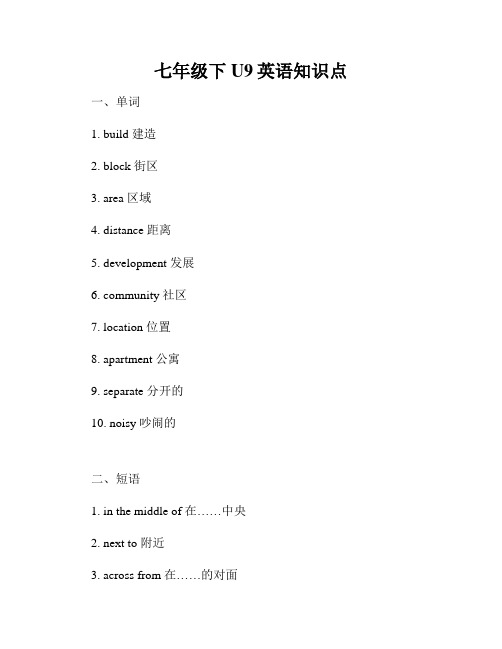
七年级下U9英语知识点一、单词1. build 建造2. block 街区3. area 区域4. distance 距离5. development 发展6. community 社区7. location 位置8. apartment 公寓9. separate 分开的10. noisy 吵闹的二、短语1. in the middle of 在……中央2. next to 附近3. across from 在……的对面4. on the left/right of 在……左边/右边5. in front of 在……前面6. in between 在……之间7. a block away 一条街之隔8. a few minutes' walk 几分钟的步行路程9. surrounded by 被……包围10. close to 靠近三、句子1. The city is located on the coast. 这个城市位于海岸边。
2. The apartment is on the second floor. 公寓在二楼。
3. The park is surrounded by tall trees. 公园被高大的树木包围。
4. The library is across from the school. 图书馆在学校的对面。
5. The supermarket is close to the bus station. 超市靠近公交车站。
6. The church is in the middle of the city. 教堂在市中心。
7. The museum is next to the art gallery. 博物馆在艺术馆附近。
8. The hospital is on the left of the post office. 医院在邮局的左边。
9. The restaurant is in front of the movie theater. 餐厅在电影院前面。
七年级下册英语第9单元知识点总结归纳

七年级下册英语第9单元知识点总结归纳一、重点单词和短语:1. often 经常2. junk food 垃圾食品3. healthy food 健康食品4. toothache 牙疼5. more 更;更多的6. less 更少的;较少的7.什么也不做(即休息)8. see a dentist 看牙医9. the same as 与……同样的10. take medicine 吃药11. feel well 感觉舒服,感觉良好12. stay healthy 保持健康13. get up 起床14. go to school 去上学15. do morning exercises 做早操16. eat breakfast 吃早饭17. do homework 做作业18. eat dinner 吃晚饭19. watch TV 看电视20. go to bed 上床睡觉二、重点句型:1. I often eat junk food after school. 我经常放学后吃垃圾食品。
2. He/She often drinks coffee and tea. 他/她经常喝咖啡和茶。
3. I don’t eat much healthy food. 我吃的不多健康食品。
4. He/She doesn’t eat any healthy food. 他/她不吃任何健康食品。
5. My tooth hurts. 我的牙齿疼。
6. I have a toothache. 我牙疼。
7. You should go to see a dentist. 你应该去看牙医。
8. I feel well today. 我今天感觉很好。
9. You should eat more healthy food and less junk food. 你应该吃更多的健康食品,少吃垃圾食品。
10. You should get up at 6:00 every morning and do morning exercises before breakfast. 你每天早上6点起床,早饭前做早操。
初中七年级下册英语知识点总结unit9

初中七年级下册英语知识点总结unit9初中七年级下册英语知识点总结Unit 9Unit 9主要介绍了一些关于生活方式和日常活动的英语词汇与句型。
通过学习本单元,我们可以学到如何用英语表达自己的日常活动以及提供建议的能力。
下面我们来总结一下本单元的重点知识点。
1. Daily activities(日常活动)日常活动是我们生活中必不可少的一部分。
本单元中,我们学习了一些常用的日常活动词汇,如:get up(起床)、have breakfast(吃早饭)、go to school(上学)、do homework(做作业)、watch TV(看电视)等。
这些词汇可以帮助我们用英语描述自己的日常活动。
2. Adverbs of frequency(频率副词)在描述日常活动时,我们通常会用到频率副词,来表示某个活动经常发生的程度。
常见的频率副词有:always(总是)、usually(通常)、often(经常)、sometimes(有时候)、rarely(很少)、never(从不)等。
例如,I always get up early.(我总是早起。
)这些词汇可以帮助我们准确表达我们的日常生活习惯。
3. Suggestions(建议)在日常交流中,我们常常需要给别人提一些建议或接受别人的建议。
本单元中,我们学习了一些用于提建议的句型,如:Why don't you...?(为什么不...?)、You should...(你应该...)、Maybe you could...(也许你可以...)等。
这些句型可以帮助我们在交流中表达自己的看法和建议,以及接受他人的建议。
4. Times and frequency(时间和频率)在描述日常活动时,我们通常需要用到词汇和句型来表达时间和频率。
本单元中,我们学习了一些词汇,如:in the morning(早上)、in the afternoon(下午)、in the evening(晚上)、on weekdays(工作日)、on weekends(周末)等。
七下unit9知识点
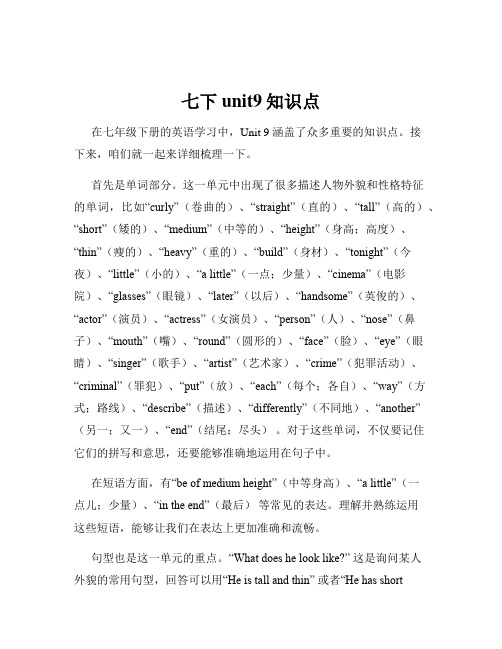
七下unit9知识点在七年级下册的英语学习中,Unit 9 涵盖了众多重要的知识点。
接下来,咱们就一起来详细梳理一下。
首先是单词部分。
这一单元中出现了很多描述人物外貌和性格特征的单词,比如“curly”(卷曲的)、“straight”(直的)、“tall”(高的)、“short”(矮的)、“medium”(中等的)、“height”(身高;高度)、“thin”(瘦的)、“heavy”(重的)、“build”(身材)、“tonight”(今夜)、“little”(小的)、“a little”(一点;少量)、“cinema”(电影院)、“glasses”(眼镜)、“later”(以后)、“handsome”(英俊的)、“actor”(演员)、“actress”(女演员)、“person”(人)、“nose”(鼻子)、“mouth”(嘴)、“round”(圆形的)、“face”(脸)、“eye”(眼睛)、“singer”(歌手)、“artist”(艺术家)、“crime”(犯罪活动)、“criminal”(罪犯)、“put”(放)、“each”(每个;各自)、“way”(方式;路线)、“describe”(描述)、“differently”(不同地)、“another”(另一;又一)、“end”(结尾;尽头)。
对于这些单词,不仅要记住它们的拼写和意思,还要能够准确地运用在句子中。
在短语方面,有“be of medium height”(中等身高)、“a little”(一点儿;少量)、“in the end”(最后)等常见的表达。
理解并熟练运用这些短语,能够让我们在表达上更加准确和流畅。
句型也是这一单元的重点。
“What does he look like?” 这是询问某人外貌的常用句型,回答可以用“He is tall and thin” 或者“He has shortcurly hair” 等。
另外,“She has long straight hair” 这样的句子用来描述某人的具体发型特征。
七年级下册 Unit 9单元重难点知识

七年级下册 Unit 9单元重难点知识一、重点短语a big nose and a small mouth 一个大鼻子和一张小嘴巴a handsome actor 一名帅气的男演员a little late 迟一点a short and heavy old man一个又矮又胖的老年男子another woman 另外一位女性be of medium build 中等身材be of medium height 中等身高draw a picture of each criminal给每个罪犯画一幅画像first of all 首先go to the movie tonight今晚去看电影have a round face 长着一张圆圆的脸have an interesting job 有一份有趣的工作have long straight brown hair 有长而直的棕发in front of the cinema 在电影院前面in the end 最后look like 看起来像……meet at seven 七点钟见police artists 警用画师put it in newspapers 把它登在报纸上remember doing... 记得做过……remember to do... 记得去做……see crimes 看到犯罪活动see things in the same way 以同样的方式看待事物see you later 待会见tall and thin 又高又瘦the man in black 穿着黑衣服的男士the real criminal 真正的罪犯wear glasses 戴眼镜your favorite actress 你最喜欢的女演员二、重点句型1.—What do you look like?你长得怎么样?—I'm short and thin.我又矮又瘦。
武汉市第二中学初中英语七年级下册Unit 9(含解析)

一、选择题1.Please remember ________the book.A.taking B.to take C.bringing D.to bring D解析:D【解析】句意:句意:请记得带来拿本书。
remember to do sth记得做某事; remember doing sth记得做了某事。
Take带走 bring 带来。
根据句意选D。
2.—________?—She is tall and has long straight hair.A.Where is Lucy from B.What does Lucy likeC.What is Lucy doing D.What does Lucy look like D解析:D【解析】句意:-Lucy长得是什么样子的?-她个子很高,有一头长的直发。
Where is Lucy from?Lucy 来自哪里?What does Lucy like? Lucy喜欢什么?What is Lucy doing? Lucy正在做什么?What does Lucy look like? Lucy长得什么样?根据下面的回答可知,这里问的是Lucy的外貌,故应选D。
3.(2017年河南)-- Jimmy, where are my glasses? I have looked everywhere.--Oh, Granny. They are _____ on your nose.A.even B.well C.right D.ever C解析:C【解析】句意:﹣﹣吉米,我的眼镜呢?我到处找遍了.﹣﹣噢,奶奶,它就在你的鼻子上。
even 甚至,well好,right正好,ever曾经,表示正好,恰恰,故用副词right。
故选C。
4.To read the words in the book,my grandpa has to wear his ________.A.glasses B.sweater C.hat D.shoes A解析:A【解析】句意:为了阅读书中的文字,我的爷爷不得不戴上他的眼镜。
七年级下册英语第9单元知识点总结归纳

七年级下册英语第9单元知识点总结归纳一、单元核心词汇总结七年级下册英语第9单元的核心词汇包括:friendly(友好的)、kind(善良的)、polite(有礼貌的)、brave(勇敢的)、truthful(诚实的)等。
通过本单元的学习,学生们可以掌握一系列描述人物品质的词汇,以便更好地了解和评价身边的人。
二、语法知识点梳理本单元的语法知识点主要包括:一般现在时、一般过去时和一般将来时的用法。
一般现在时用来描述一个人的习惯、特点或事实;一般过去时用来描述过去发生的事情;一般将来时用来描述将来的计划或预测。
通过学习这些时态,学生们可以更好地表达不同时间状态下的动作或状态。
三、重点句型讲解1.询问对方特点的句型:What kind of person are you? 你是一个什么样的人?2.描述他人特点的句型:He/She is afriendly/kind/polite/brave/truthful person.他/她是一个友好/善良/有礼貌/勇敢/诚实的人。
3.表达将来计划的句型:I will do something.我将要做某事。
四、实用口语表达归纳本单元的实用口语表达包括:1.介绍自己:Hello, my name is ...我叫……2.询问对方来自哪里:Where are you from? 你来自哪里?3.表达感谢:Thank you./You"re welcome./My pleasure.谢谢/不客气/我的荣幸。
4.表达歉意:I"m sorry./That"s all right./Don"t mention it.抱歉/没关系/不用谢。
五、练习题解析本单元的练习题主要包括词汇填空、选择题、翻译句子等。
学生们可以通过做这些练习题来巩固所学知识,提高英语应用能力。
总结:七年级下册英语第9单元主要以描述人物特点和品质为核心内容,学生们通过学习本单元可以掌握一系列描述人物特点的词汇、时态用法和实用口语表达。
七年级下册英语Unit9知识点
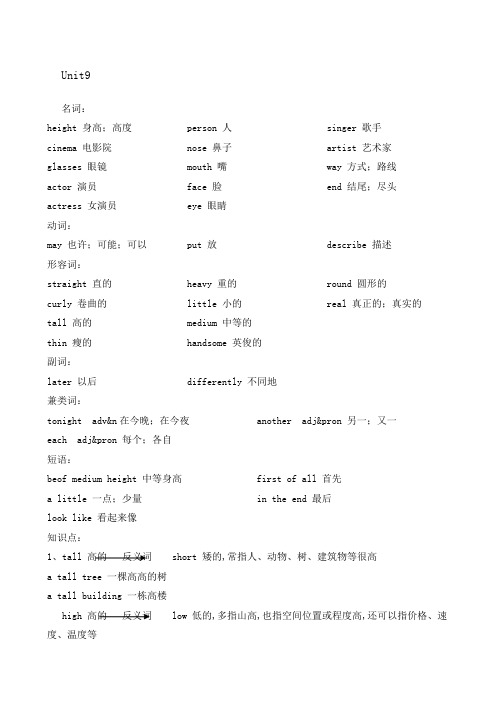
Unit9名词:height 身高;高度cinema 电影院glasses 眼镜actor 演员actress 女演员person 人nose 鼻子mouth 嘴face 脸eye 眼睛singer 歌手artist 艺术家way 方式;路线end 结尾;尽头动词:may 也许;可能;可以put 放describe 描述形容词:straight 直的curly 卷曲的tall 高的thin 瘦的heavy 重的little 小的medium 中等的handsome 英俊的round 圆形的real 真正的;真实的副词:later 以后differently 不同地兼类词:tonight adv&n在今晚;在今夜each adj&pron 每个;各自another adj&pron 另一;又一短语:beof medium height 中等身高a little 一点;少量look like 看起来像first of all 首先in the end 最后知识点:1、tall 高的反义词 short 矮的,常指人、动物、树、建筑物等很高a tall tree 一棵高高的树a tall building 一栋高楼high 高的反义词 low 低的,多指山高,也指空间位置或程度高,还可以指价格、速度、温度等a high mountain 一座高山high price 价格高2、medium 中等的be of medium height 中等身高be of medium build 中等身材My uncle is of medium height. 我叔叔中等身高;区分:middle 中间的;中部的There is a tree in the middle of his yard. 他的院子中央有一棵树; 3、thin 瘦的反义词 fat 胖的thin 薄的反义词 thick 厚的4、1询问某人外貌:What + do/does + 主语 + look like ……长什么样What do your parents look like你的父母长什么样What does Tom look likeTom长什么样2询问某人性格或品质:What + be + 主语 + like ……是什么样的人—What is Tina likeTina是什么样的人—She is kind. 她很善良;5、描述外貌的常用句型1表示某人的身高或身材:主语 + be of + 形容词 + height/build.My math teacher is of medium height. 我的数学老师中身高;He is of small build. 他体型偏小;2表示某人的高矮胖瘦:主语 + be + 形容词Lily is short and thin. Lily很瘦小;My music teacher is tall. 我的音乐老师很高;3表示某人的头发状况:主语 + have/has + 形容词 + hairMary has curly hair. Mary留着卷发;My sisters have long and straight hair. 我的妹妹留着长直发;4表示某人戴眼镜:主语 + wear/wears + glassesTina and Jack wear glasses. Tina和Jack戴着眼镜;My brother wears glasses. 我弟弟戴着眼镜;6、be going to 将要……1be going to + 地点将要去某地She is going to London tomorrow. 她明天将要去伦敦;2be going to do sth 打算做某事We are going to visit the Great Wall tomorrow. 明天我们打算去长城游玩;7、may 也许;可能;可以1表示推测,“也许;可能”,后接动词原形—Is Mike in the classroomMike在教室里吗—I'm not sure. He may be in the library. 我不确定,他可能在图书馆;He may come tomorrow. 他明天可能来;2表示许可,“可以”—May I come in, sir 先生,我可以进来吗—Of course.8、a little 一点;少量1a little + 形容词/副词,有点……,表示程度It's a little hot today. 今天有点儿热;2a little + 不可数名词,一点;少量……He drinks a little milk every day. 他每天都喝一点牛奶;辨析:1few + 可数名词复数,几乎没有……,表示否定There is few eggs. 这没几个鸡蛋了;2a few + 可数名词复数,少量;一些……,表示肯定Tom works a few hours a day. Tom一天工作几个小时;3little + 不可数名词,几乎没有……,表示否定She has little free time. 她几乎没有空闲时间;4a little + 不可数名词,一点;少量……,表示肯定My sister knows a little French. 我妹妹懂一点法语;—Hurry upThe movie is beginning. —Don't worry. There is still time left.9、1glasses 眼镜复数 a pair of glasses 一副眼镜 wear glasses 戴眼镜2glass 玻璃,不可数3glass 玻璃杯,可数 a/one glass of 一杯 two glasses of 两杯10、表示身体部位的词:eye 眼睛ear 耳朵face 脸mouth 嘴arm 胳膊leg 腿foot 脚hand 手neck 脖子11、动词 + er组成表示职业的词:sing 唱歌→ singer 歌手paint 画画→ painter 画家teach 教→ teacher 教师work 工作→ worker 工人write 写→ writer 作家drive 开车→ driver 司机12、 talk to sb和……谈话,一方说,另一方听talk with sb 和……谈话,谈话双方有交流Mr. Black wants to talk to you. 布莱克先生想找你谈话;Tina often talks with her friends on the phone. Tina经常在电话里和她的朋友交谈;13、 draw a picture of 画一幅……的画draw a picture for 为……画一幅画Can you draw a picture of a horse 你能画一匹马吗This painter is going to draw a picture for the king. 这位画家打算为国王画一幅画;14、each每个;各自1each + 可数名词单数 = every + 可数名词单数,每个;各自……,做主语谓语动词用单数Each/Every student has a book. 每个学生都有一本书;2each of + us/them = We each/They eachEach of us likes English. = We each like English. 我们每个人都喜欢英语;15、another 另一个;有一个,指三者或三者以上中的“另一个”another + 可数名词单数another + 基数词>1+ 可数名词复数We need another computer. 我们还需要一台电脑;He needs to wait another two hours. 他需要再等两个小时;16、询问及描述外貌1常见的询问外貌的表达What do/does……look like ……长什么样Do/Does……have straight or curly hair ……留着直发还是卷发Is……tall or short/heavy or thin ……高还是矮/胖还是瘦What does Tim look likeTim长什么样Does your math teacher have straight or curly hair你的英语老师留直发还是卷发Is your brother tall or short你弟弟高还是矮2常用的描述外貌的表达主语 + be动词 + 表示外貌特点的形容词主语 + have/has + 名词短语主语 + be动词 + of……build/heightHe is really/a little tall. 他十分/有点儿高;He has big blue eyes. 他有着蓝色的眼睛;They have straight hair. 他们留着直发;They are of medium height. 他们中等身高;1.Let's go to the c and see a movie tonight.2.Bill looks l his father. They both have big eyes.3.—Does your sister have c hair —No, her hair iss .4.I can't see the blackboard clearly. Please give me my g .5.The box is so h that I can't carry it.6.Steve is not too tall or too short. He is of medium high.7.—LookHere come the movie act. —WowHow handsome they are8.—Who's your favorite sing9.—Jay Chou. I like his songs very much.10.I don't know these personunder that big tree.11.We know people may describe the same thing different.12.My sister is very because she eats a little.13. of us wants to pass the exam because it is very important toall of us.14.—Mum, I sign for the box. What's in it —I'm not sure. It be apresent from your uncle.15.—I don't like this bag. Please show me 另一one.16.—What does your father do, Lily —He is an . His job is to keeppeople safe.17.—Who do you think can win the game 最后18.—Tom, I think.19.My sister 将要see my aunt tonight.20.He wants to 为她画一幅画.21.Please 放your books on the table.22.It's the best 方式to solve the problem.23.——He is of medium build and has straight hair.24.Bob short hair and he of medium build.25.Jeff is short and thin. 对划线部分提问 Jeff26.27.David is not too heavy or too thin. 改为同义句Davidis .28.Does Lisa have long hair作否定回答No, .。
七年级下英语Unit9知识点
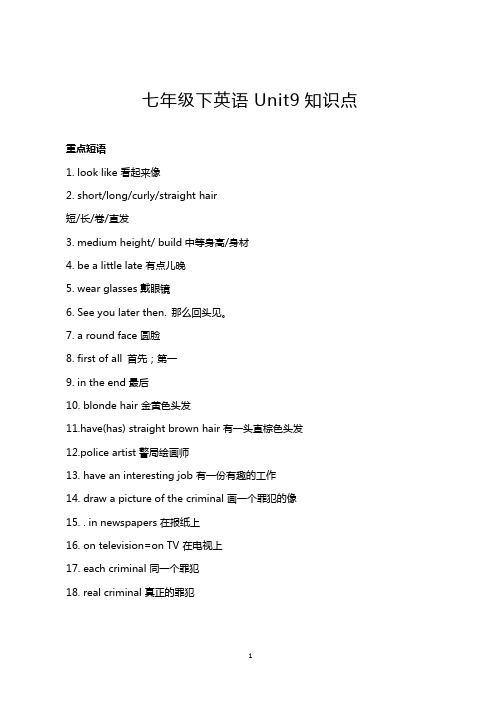
七年级下英语Unit9知识点重点短语1. look like 看起来像2. short/long/curly/straight hair短/长/卷/直发3. medium height/ build中等身高/身材4. be a little late 有点儿晚5. wear glasses 戴眼镜6. See you later then. 那么回头见。
7. a round face 圆脸8. first of all 首先;第一9. in the end 最后10. blonde hair 金黄色头发11.have(has) straight brown hair 有一头直棕色头发12.police artist 警局绘画师13. have an interesting job 有一份有趣的工作14. draw a picture of the criminal 画一个罪犯的像15. . in newspapers 在报纸上16. on television=on TV 在电视上17. each criminal 同一个罪犯18. real criminal 真正的罪犯重点句型1.I may be a little late. 我或许要晚一会儿。
2. He isn’t tall or short. 他个头既不髙也不矮。
3.---What does he look like? 他长什么样?4. ---She has long straight hair.她留着长直发。
5. ---What do they look like? 他们长什么样?---They’re of medium build.他们中等身材。
6. ---Do they have straight or curly hair? 他们留有直发还是卷发?7. Is he tall or short? 他个头高还是矮呢?8. He isn’t tall or short He’s of medium height. 他既不髙也不矮,中等个头。
武汉市初中英语七年级下册Unit 9知识点总结

一、选择题1.Our new English teacher has ________ hair and she is good-looking.A.black long beautiful B.beautiful black longC.long beautiful black D.beautiful long black D解析:D【详解】句意:我们的新任英语老师长着美丽的长黑发,她长得很漂亮。
形容词beautiful意为“漂亮的”,long意为“长的”,black意为“黑色的”,这里考查形容词并列时的顺序问题,并列时其遵循“限(县),评(兵),形(行),龄(令),色(杀),国(国),材(才),用(用)”的顺序,beautiful是“评价类形容词”,long是“形状类形容词”,black是“颜色类形容词”,因此顺序为beautiful long black,故选D。
【点睛】当两个或者两个以上的形容词放在一个名词前做定语时,如何排列他们的语序对很多学生来说都是一个头痛的问题。
我们不妨用一句诙谐而又有趣味性的押韵语句来记忆多个形容词的语序排列,那就是“限(县),评(兵),形(行),龄(令),色(杀),国(国),材(才),用(用)。
1.限:指限定词。
包括冠词,指示代词,形容词性物主代词,数词及不定代词等。
例如:a desk, an actor, that actress, his house, some planes, ten books2.评:指说话人对某人某事物发表意见,表示评价的形容词,即通常所说的描绘性形容词。
诸如ugly, well-known, handsome, beautiful, famous, ordinary等等。
例如:a beautiful desk, that famous teacher, my handsome son, his beautiful girl friend3.形:指形状。
- 1、下载文档前请自行甄别文档内容的完整性,平台不提供额外的编辑、内容补充、找答案等附加服务。
- 2、"仅部分预览"的文档,不可在线预览部分如存在完整性等问题,可反馈申请退款(可完整预览的文档不适用该条件!)。
- 3、如文档侵犯您的权益,请联系客服反馈,我们会尽快为您处理(人工客服工作时间:9:00-18:30)。
七(下)unit 9 重点短语
Section A
1. 看起来看look like
2. 卷发/直发curly hair/straight hair
3. 短发/长发short hair/long hair
4. 中等身高be of medium height
5. 留着长直黑发have long straight black hair
6. 又瘦又高thin and tall
7. 又矮又胖short and heavy
8. 今晚去看电影go to a movie tonight 9. 七点钟见面meet at seven
10. 可能会晚一点may be a little late 11. 电影院前面in front of the cinema
12. 留棕色头发have brown hair 13. 戴眼镜wear glasses
14. 不高也不矮not tall or short 15. 那么稍后见see you later then
16. 最喜欢的男演员/女演员one’s favorite actor or actress
17. 你朋友长什么样?What does your friend look like?
18. Peter是高还是矮?他不高也不矮。
Is Peter tall or short? He isn’t tall or short.
19. 他留着短短的金色卷发,很帅。
He has short curly blond hair. He is really handsome.
20. 这个人中等身高,留着短发。
The man is of medium height with short hair.
21. 戴眼镜的那个男士是我老师。
The man with/wearing glasses is my teacher.
22. 那个男士戴着眼镜。
他是我的老师。
The man wears glasses. He is my teacher.
Section B
1. 大鼻子a big nose
2. 小嘴巴a small mouth
3. 瓶口the mouth of the bottle
4. 圆脸a round face
5.大眼睛big eyes 6. 长脸a long face
7.推迟put off 8. 戴眼镜wear glasses
9. 那个长金发女郎the woman with long blonde hair
10. 一份有趣的工作an interesting job 11. 一位警局绘画师a police artist
12. 看见犯罪活动see crimes 13. 另一个女的another woman
14. 画一幅罪犯的肖像draw a picture of the criminal
15. 大约三十岁about 30 years old 16. 真正的罪犯the real criminal
17. 最后in the end 18. 首先first of all
19. 穿牛仔裤和运动鞋wear jeans and sports shoes
20. 以…结束end up with …21.守口如瓶keep your mouth shut
22. 留神,留意,照看keep an eye on…
23. 他们告诉他罪犯长什么样。
They tell him what the criminal looks like.
24. 把它刊登在报纸上和上电视来找他。
Put it in newspapers and on television to find him.
25.人们不总是以相同的方式来看待事物。
Peo ple don’t always see things the same way
26. 他们将同一个人描述得不一样。
They describe the same person differently.
27. 他们并不总是记得牢靠。
They don’t always remember well.
28. 让我告诉你他长什么样。
Let me tell you what he looks like.
1
七(下)unit 9 重点短语检测
Section A
1. 看起来看
2. 卷发/直发
3. 短发/长发
4. 中等身高
5. 留着长直黑发
6. 又瘦又高
7. 又矮又胖
8. 今晚去看电影9. 七点钟见面
10. 可能会晚一点11. 电影院前面12. 留棕色头发13. 戴眼镜
14. 不高也不矮15. 那么稍后见
16. 最喜欢的男演员/女演员
17. 你朋友长什么样?
18. Peter是高还是矮?他不高也不矮。
19. 他留着短短的金色短发,很帅。
20. 这个人中等身高,留着短发。
21. 戴眼镜的那个男士是我老师。
22. 那个男士戴着眼镜。
他是我的老师。
Section B
1. 大鼻子
2. 小嘴巴
3. 瓶口
4. 圆脸
5.大眼睛 6. 长脸
7.推迟8. 戴眼镜
9. 那个长金发女郎
10. 一份有趣的工作11. 一位警局绘画师12. 看见犯罪活动13. 另一个女的
14. 画一幅罪犯的肖像
15. 大约三十岁16. 真正的罪犯17. 最后18. 首先
19. 穿牛仔裤和运动鞋
20. 以…结束21.守口如瓶
22. 留神,留意,照看
23. 他们告诉他罪犯长什么样。
24. 把它刊登在报纸上和上电视来找他。
25. 人们不总是以相同的方式来看待事物。
26. 他们将同一个人描述得不一样。
27. 他们并不总是记得牢靠。
28. 让我告诉你他长什么样。
2
3。
